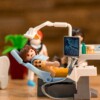In this post-election period, there is a desire among many people to come together across political differences to restore civility and cooperation within workplaces, families, or even marriages. One of the major barriers to doing this is the belief that “I am right; they are biased,” which is referred to as the bias blind spot. It is a bit ridiculous for me to argue that Christians are less biased than other people as if they don’t also possess a blind spot. If anything, the Jesus in America Survey reveals people think Christians are more judgmental and close-minded. Data suggests that when people have “mission jobs” (that is, pastor, missionary, social worker, and so on) or happen to think of how moral they are in one area, they are more likely to behave immorally in another, through a form of moral self-licensing.1 I have written a forthcoming book with the audacious title, The Unbiased Self: The Psychology of Overcoming Cognitive Bias. In it, I do not argue that Christians are less biased- —if anything I think they are just as biased as everyone else— but I arguie that Christians should be less biased because the foundation of a Christian’s identity is different.
I write in the book that “teaching people about bias does not reduce the bias blind spot.” When research on the bias blind spot emerged, researchers wondered whether thoughtful people might be able to recognize their own bias even if normal people could not.2 So to identify the thoughtful people, whom they labeled “cognitively sophisticated,” the researchers collected SAT scores, various personality measures related to cognition, and the results from the cognitive reflection test.3 The cognitive reflection test includes this question:
A bat and a ball cost $1.10 in total. The bat costs $1.00 more than the ball. How much does the ball cost? ___ cents.
For most people, the first answer is “ten cents.” The right answer, which is five cents, requires more thought. Participants who spent time getting the right answer to this type of question were labeled “cognitively sophisticated.” The authors of the study hypothesized that the cognitively sophisticated participants (i.e., the thoughtful people) might be less susceptible to both cognitive biases and to the bias blind spot. What the researchers found, however, was that there was no correlation (and on some biases, a positive correlation) between scores on the measures of cognitive sophistication and both susceptibility to the biases and the bias blind spot; in fact, all participants demonstrated susceptibility to bias as well as evidence of the bias blind spot.
Said another way, thoughtful people were just as likely to be biased and just as likely to assume that other people were more biased than they were. The conclusion then is that most people are likely to fall prey to bias and are unlikely to recognize it in themselves even after being taught to recognize it. The blind spot is in all our eyes. It explains why Jesus warned us that we often see the “speck of sawdust” in our brother’s eye yet “pay no attention to the plank” in our own eyes (Luke 6:41-42). The plank is in the blind spot. Therefore, rather than just informing people about cognitive bias, we should consider that bias is tied to identity maintenance.”4
If bias comes from identity maintenance, then Christians ought to be less biased because of the very features that would make a person distinctly Christian. – The central feature that distinguishes someone as Christian is an identity that is fundamentally secure. No one can fail at being a child of God or a sinner saved by grace. Those identities are secure. Nearly every other source of identity a person can hold is one in which failure is a possibility. Jobs can be lost, health can be compromised, and relationships can fail or end in death. I have yet to imagine a scenario in which a person’s position as a child of God or a sinner saved by grace can be damaged because those positions don’t depend on human agency. They are granted to us by God. Because the identity of Christians is secure, it makes more sense to argue that Christians ought to be less biased because they have less of a need to prove that they are right and/or that they have a need to bend the truth to feel good about themselves.
Now, let’s turn to a conversation you might be having with someone who differs from you politically. The political conversation might feel threatening if political beliefs are the basis of your identity. Even if they aren’t central to your identity, you may be tempted to think, “I am right; therefore, they are biased.” Instead of focusing on their bias, focus on the accuracy of your own view. In terms of being right, how sure are you of your “rightness”? All of us are guilty of the “all I see is all there is” bias which leads us to think that we possess all the relevant facts of an issue.
When I am forced to think more deeply about nearly any topic, I realize that what I see is probably only a fraction of all there is, so I should approach the topic with more humility and curiosity. In science, statistics are built on the idea that we are 95% sure that something is true before we publish it. When I was interviewed to be a part of a jury, I was asked what represents reasonable doubt, and I answered that I would need to be 95% sure before I was willing to vote to convict. Annie Duke in her book, Thinking in Bets,5 argues that you should add a probability estimate to your decisions. Before you move to divide yourself against another person or group of people, you ought to consider where your opinions come from and how strongly you really ought to hold them.
After considering the confidence, accuracy, and bias in your own position, I would challenge you to consider how you want to respond to another person’s bias. Even having met the high bar required to feel confident that you are right, you must examine whether any opinion you hold that makes it harder to love people. Is there room in your loving of others, to accept the people who get it wrong?
People who experience awe are more accurate and less biased because we have a more accurate view of our own shared humanness6 and experience greater humility.7 To stand in awe of something is to recognize its vastness. Once you see the vastness of God’s presence, the differences between humans seem smaller. Once astronauts have been to space, they start to see the fragility of the earth and the need for humanity to work together. Once you have encountered God, you ought to also see the fragility of humanity and the bias that we all possess. Recognizing that we will never be completely unbiased makes it easier to accept the biases of others. God is unbiased; we are not.
The next time you are having coffee with a friend only to realize that you are not politically aligned, rather than skirting the topic, you could have a productive and even loving conversation. I hope you can be secure in your own identity in a way that allows you to see your own bias first and then accept the biases of others with compassion.
Footnotes
- Anna C. Merritt, Daniel A. Effron, and Benoît Monin, “Moral Self-Licensing: When Being Good Frees Us to Be Bad,” Social and Personality Psychology Compass 4, no. 5 (2010): 344-57.
- Bias Blind Spot,” Journal of Personality and Social Psychology 103, no. 3 (2012): 506-19.
- Shane Frederick, “Cognitive Reflection and Decision Making,” Journal of Economic Perspectives 19, no. 4 (2005): 25-42.
- Erin Devers, The Unbiased Self, InterVarsity Press, 2025.
- Annie Duke, Thinking in Bets: Making Smarter Decisions When You Don’t Have All the Facts (New York: Penguin, 2019), 210.
- Cheng, Lei, and Xijing Wang. “Shining our humanity: The benefits of awe on self-humanity.” Emotion, 24, no. 3 (2024), 589-601.
- Stellar, Jennifer E., Amie Gordon, Craig L. Anderson, Paul K. Piff, Galen D. McNeil, and Dacher Keltner. “Awe and humility.” Journal of Personality and Social Psychology, 114, no. 2 (2018): 258.























Excellent article! Thank you!
This is a challenging topic. The fact is people have values and live according to them. As Christians, we hold to a particular set of values, found in Scripture, and according to those, regarding the treatment of people, marriage, and sexual practices for example, we live and relate to the world around us. Christ in fact commands us to do so, to live according to His word. Inherent in those values are biases; we are not impartial to the definitions of gender and marriage, for example. We cannot be if we are to think and live Biblically. What we need to learn to do is relate in love to those whose opinions differ from ours. The key is not to “just agree and get along”. It is to “disagree and still get along”, treating those who oppose our views with the respect we desire from them, without abandoning our beliefs. We cannot love both the Lord and our neighbors otherwise. It is not easy, and we are going to have scars because some who oppose us will not respond to us according to the Golden Rule. We will be hated, bu we are called to love nonetheless.
Nicely said Erin. Recognizing the awesomeness of God’s creation should blur our vision from such sharp focus on others’ perceived shortcomings. And congrats on using that great mind to think and write about important matters – I’m happy to know you:)
The concept of “awe” is rather informative. Prompts much reflection. Excellent book. Kudos to Jon Boyd for pursuing this subject in print for IVP.